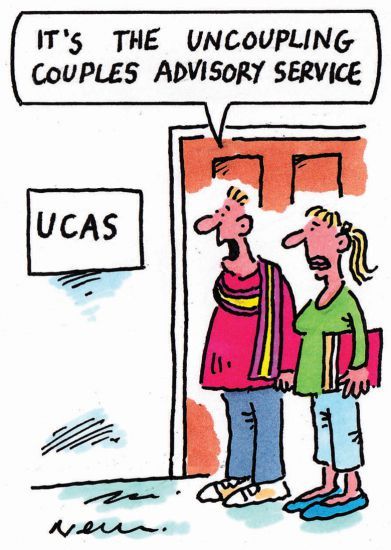
Split up or have a go at a long-distance relationship? It’s a dilemma faced by many love-struck teens, who, armed with their A-level results, are wondering whether they should stick by their current squeeze through university. Advising on such issues is always a delicate matter, but one 18-year-old was unimpressed by the words of wisdom from an unlikely source – a leaflet sent out by Ucas, which she claimed was urging her boyfriend to give her the boot, The Sun reported on 17 August. Under a subsection titled “what not to take”, the leaflet tells would-be students to “save the heartache now and start your university life as a free agent”, adding: “Trust me, you won’t regret it.” “Why the fk did Ucas send this to my bf,” said Lauren Rosenbaum, from Fife, Scotland, in a Twitter message, retweeted more than 5,000 times. Ms Rosenbaum – who is off on a gap year while her boyfriend, Max Brooks, 17, starts at Edinburgh Napier University – said that the couple had “no intentions of breaking up”. Ucas said that it did not write the advice, adding that “students are savvy enough to make their own decisions about what is right for them”.
Sinister scenes apparently showing a human sacrifice by hooded scientists at Cern have been revealed as an elaborate hoax, The Times reported on 19 August. Shot from an office of the Swiss physics laboratory, the footage of seven cloaked figures gathered at night in the institution’s courtyard caused a global stir after it went viral last week, the paper explained. The video, which shows a young woman lying down before seemingly being stabbed in front a statue of the Hindu god Shiva, led to the Geneva lab having to take the “unusual step of denying that ritualistic murder occurs on its premises”, the newspaper reported. “This video is a work of fiction showing a contrived scene,” said Cern, adding that it “does not condone this kind of spoof”, which is thought to have been perpetrated by visiting summer school students.
A more familiar prank – the alien autopsy – will be given a new twist when one of the UK’s top pathologists performs a mock examination of a Martian. Sue Black, professor of anatomy and forensic anthropology at the University of Dundee, will lead the autopsy as part of a festival to mark the 150th anniversary of H. G. Wells’ birth, BBC News online reported on 18 August. The alien that will go under Professor Black’s knife is a model based on Wells’ vision of how intelligent life might have evolved on Mars. The event to honour the author of War of the Worlds is part of Being Human 2016, a UK-wide humanities festival taking place in November.
A 102-year-old scientist has been asked by his university to pack up his office after he was deemed unfit to make the 90-minute commute to work, the Daily Mail reported on 21 August. David Goodall, Australia’s oldest working scientist, was told to work from home by Edith Cowan University, in Perth, after staff raised concerns over his mammoth journey, which included catching two buses and a train at least four times a week, the paper said. Dr Goodall urged the university to think twice, while his daughter Karen Goodall-Smith said that it “would be the worst thing you could possibly do”. However, vice-chancellor Steve Chapman insisted that Dr Goodall “will always be welcome” on campus and said that the university would pay for his travel to pre-arranged events, adding that Edith Cowan hoped to renew his honorary appointment for another three years when it expired in December.
It was a record-breaking medal haul for Team GB at the Rio Olympics, but US universities are still streets ahead when it comes to clinching podium finishes. Stanford University finished top for Olympic medallists with 27 in total, as swimmer Katie Ledecky’s medals accounted for five of the 14 claimed in the pool by alumni and students, according to campus news site Rule of Tree on 21 August. Stanford was followed by the University of California and the University of Southern California, both on 21 medals. Team GB still boasted plenty of university graduates. Loughborough University athletes won 12 medals, five of which were gold, which would place the institution 17th on the medals table, just behind Jamaica and Kenya, if it were a country. Other cerebral Olympic medallists included super-heavyweight boxer Joe Joyce, a fine arts graduate from Middlesex University, who won silver, and current University of Birmingham student Lily Owsley, who claimed gold in the dramatic women’s hockey final on 19 August.